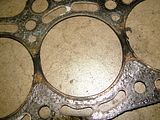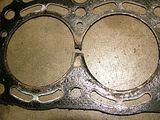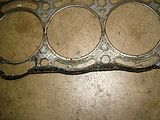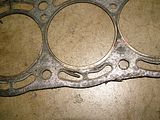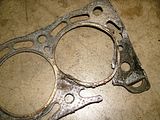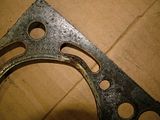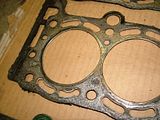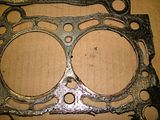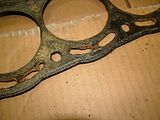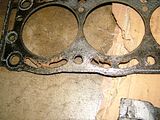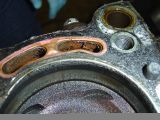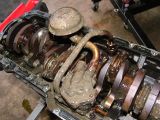Problem is 85% of the shops will clamp down the head, and either move it and reclamp to do entire face, or not have it clamped correctly, thus when it gets machined, it essetially takes the HIGH spots, which can be bad.
If you took a brick, and somehow twisted it, then measured the amount it was "warped" and then took a grinder and made one side flat with the ground the other side is still warped. Many times you get a harmonic "knock" in and around 2800-3200 RPM, if the machining has been done incorrectly. Although nice and tight when it is first up and running after the milling, what happens is the CAMS are straight, and want to remain that way because they are balanced and turning, but when the head was milled and the high spots taken off the bottom.... if it was not torqued down to the mill table properly the TOP side of the head is now out of alignment. This pulls the CAM JOURNALS off centerline when the head is torqued down, and if this happens a MHG compounds the issue because of the fact that there is less "give" in it, over the composite. End result your NEW motor with fresh pistons and valve seals, and all your new parts sounds nice and tight (because it is) for about 2000-3000 miles. At which point the cams ( that have actually been RUBBING the journals that are out of alignment) wear the journals enough t the point there is much more slackfor them to "walk" around. You get into the harmonic areas of the engine, and they do a little jogging and shaking, making noises. "It sounds like a rod knock, but seems to be in the head...."
Never ever take a head to a shop and have tell them "Just clean the block surface up ..." what they are going to do is take it over to the surface grinder and lay it on the nice flat table hold it and turn it on until the surface has a nice uniform finish. Now they have taken your twisted brick and made one side flat, in an unstressed situation. It will bolt down fine, and torque good, and yes the bottom will be flat, but the top is still in the unstressed "twist".
If anyone has had there head recently done and has it torqued down on the block, no timing belt on, you should be able to EASILY turn the cams, and giving them a quick spin they should have only the assembly lube friction. If they are hard to turn and you have torqued the cam caps, and the head to proper specs. I would take it back to whatever shop did the machine work and ask them what they are going to do about your head surface. If it is ran like that it is very hard to find oversized cams......... and you will not know until down the road 1-4 or 6 months depending on how much you drive the car, by then they are certainly going to say it was not thier fault.
Sorry about rambling, just seems to be a common issue I have seen 3-4 times with members that have had machine work done, and I really hate to see dreams ruined by incorrect work.
JoelD

